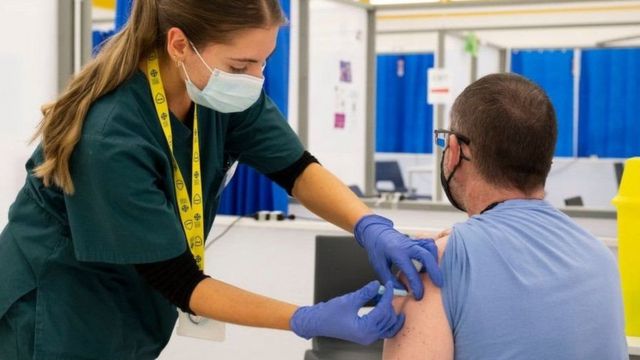- Mizanur Rahman Khan
- BBC Bangla, London
18 January 2022

“When will the covid pandemic end?” or “When will I be able to go back to normal life again?” – there is hardly anyone who has not asked such a question in the last two years.
Hopefully, scientists say, these questions will be answered – “maybe very soon.”
Many of them believe that the coronavirus variant is under a lot of pressure and as a result, it is getting weaker day by day. Also, due to the vaccination of people all over the world, the immunity of the human body has become stronger. From all this, it can be assumed that the time of the epidemic has started to run out.
They say the Covid pandemic has already “started to end”. The signs that it is now in its final stages are clear.

But the question is: what after the pandemic? Will life go back to the way it was before, or will a new situation be created? Will the virus completely disappear from this world?
Scientists say there is no doubt that Covid will exist, not as a ‘pandemic’ but as an ‘endemic’.
In other words, a new post-Covid world is coming in front of us where even if not so many people die due to coronavirus like the epidemic, this disease will remain like ten other common diseases.
- Delta variant infection in Bangladesh above 80 percent, DG Health
- Why are people getting infected with the coronavirus despite being vaccinated?
- Symptoms that occur in the body of those affected by the Amicron variant
- Micron wave in Europe-America, infections in record numbers
Pandemic beginning to end?
Professor Julian Hiscox, a professor at the University of Liverpool in the UK, told the BBC’s health and science correspondent James Gallagher: “We’re almost there. You could say the pandemic is coming to an end. At least in the UK. I think in 2022 we’ll be back to pre-pandemic conditions. will go.”
Micron is one of the symptoms of the weakened variant of the coronavirus. Scientists hope that the more this variant spreads, the weaker the virus will become. And that will end the biggest health crisis of this century.
But the chief scientific officer of Bangladesh’s pathology, disease control, and research institute IEDCR. ASM Alamgir doesn’t think the current pandemic is ending anytime soon.

“A review of the various respiratory virus pandemics over the last 100 years shows that those epidemics have lasted from one to three years,” he said.
“There are two possibilities. The more mutations we’re seeing in the micron, the more likely it is to become infected again. Whenever the virus is in mass transmission, there’s more potential for the virus to mutate. Then the virus could become weaker. It could also become stronger. So that’s telling if the pandemic is coming to an end. We have to wait for some more time,” he said.
“Where there are still over 20/25 lakh cases per day, five to seven thousand people are dying, there is a weak variant – it is not yet time to make that prediction.”
The cause of the end of the epidemic
The main reasons behind this are two: on the one hand, the weakening of the virus and on the other hand, the increase in the immune system of the host of the virus, i.e. the human body.
Scientists say that more than 320 million people around the world have been infected with the coronavirus in the last two years, and many people have been vaccinated to protect themselves from it, causing their bodies to develop antibodies to fight the virus.
The knowledge of resistance to it is also created in the human body.
When this new virus emerged in Wuhan, China in December 2019, it was completely unknown to the body’s immune system, a completely new virus, and they didn’t know how to fight it. At the same time, there was no medicine, no vaccine.
But in the meantime, the human body has developed the ability to deal with Covid. Our body’s immune system now knows more about the virus than ever before. They also have the experience of overcoming it.
This moment-to-moment fight has left the virus much weaker than before to mutate.
Amicron variant can be mentioned in this regard. Although it is more infectious than any of the previous variants, it does not overwhelm the patient as before, and the hospitalization or death rate associated with this variant is much lower.
But is this picture of resistance the same throughout the world?
Fewer people have been affected by the coronavirus in poorer countries than in Western countries. Vaccination rates are also very low in these countries.
As a result, even in poor countries, the epidemic is now at its last stage – can it be said?
It should be remembered that although the number of deaths in these countries is low, the ability of the human body to resist the virus is not yet developed.
ICR scientist Mr. Alamgir said, the whole world has not yet been vaccinated equally.
“The antibodies or immunity that is produced from a normal infection does not last long. But if we can increase the vaccination rate, get at least 70 percent of the world covered, then the situation will be different.”
He said, “With the disparity in vaccine delivery, no one knows how long it will take to vaccinate everyone. America and Europe have had a lot of vaccinations. Asia has less, Africa even less. If there is an even distribution of vaccines if everyone can be vaccinated at the same time.” Then maybe the virus can be prevented. Controlling it in one country or two countries or one region will not end the epidemic. That is why both infections and deaths must be reduced all over the world at the same time.”
What after the pandemic?
Scientists say the world faces two possibilities: Either Covid will be completely eradicated, as happened with the Ebola virus in West African countries. Or it gets weaker and stays with us for a long time like the common cold, HIV, measles, malaria, or tuberculosis.
Scientists think the same thing is going to happen with Covid.
University of London virologist Dr. Elisabetta Groppelli told the BBC, “I am very optimistic that we will soon reach a situation where the virus will continue to spread and we will have to take some measures to protect vulnerable people. But ordinary people will not suffer too much.”
Epidemiologists consider a disease ‘endemic’ only when the level of the disease is stable and what is likely to happen next. But when a disease appears suddenly and spreads rapidly to different countries, they consider it a ‘pandemic disease’.
“We will go endemic very quickly,” said Prof Azra Ghani, an epidemiologist at Imperial College London. “It seems like a long time but you have to remember that it was only a year ago that people started being vaccinated. And because of this vaccination, we live much more freely than before.” I can live.”
But this situation could worsen if new variants emerge that can make people seriously ill.
Scientists say it is important to remember that ‘endemic diseases’ are not always debilitating.
“There are some endemic diseases that kill a lot of people,” said Professor Ghani.
Smallpox has been considered an endemic disease for thousands of years causing many deaths. As a result, one-third of people who get this disease die. Malaria is also an endemic disease that kills about 600,000 people worldwide every year.
new life
Professor Hiscox believes the situation is unlikely to worsen again.
“Regardless of whether the new variant or the old variant comes out, most people, when they get the coronavirus, will have a little bit of a cold, a little bit of a headache, and then we’ll be fine,” he said.
But there will be some people, especially the elderly and those with major medical conditions, who will remain fragile and some will die from ‘endemic covid’. Therefore, we have to make new decisions about how we will live with this virus.
Professor Hiscox said flu kills many people around the world in winter when people don’t wear masks or practice social distancing.
He feels that there is little chance of a lockdown in the future and restrictions on gatherings will not be imposed. The covid test may also go up this year.
However, ASM Alamgir said, “People are now realizing that wearing a mask reduces the risk of respiratory diseases. After this epidemic, we may have to accept it for a long time. Hygiene may not be lost from life. Maybe in the future, we will have a new normal life. to enter. We may have to live a regulated life by following certain rules.”
But those who are vulnerable may need to take a booster every year before winter to boost their immune system.
Whether it’s the flu in the winter or Covid – whatever the cause, it’s the same. As one scientist said, “A man cannot die twice.”